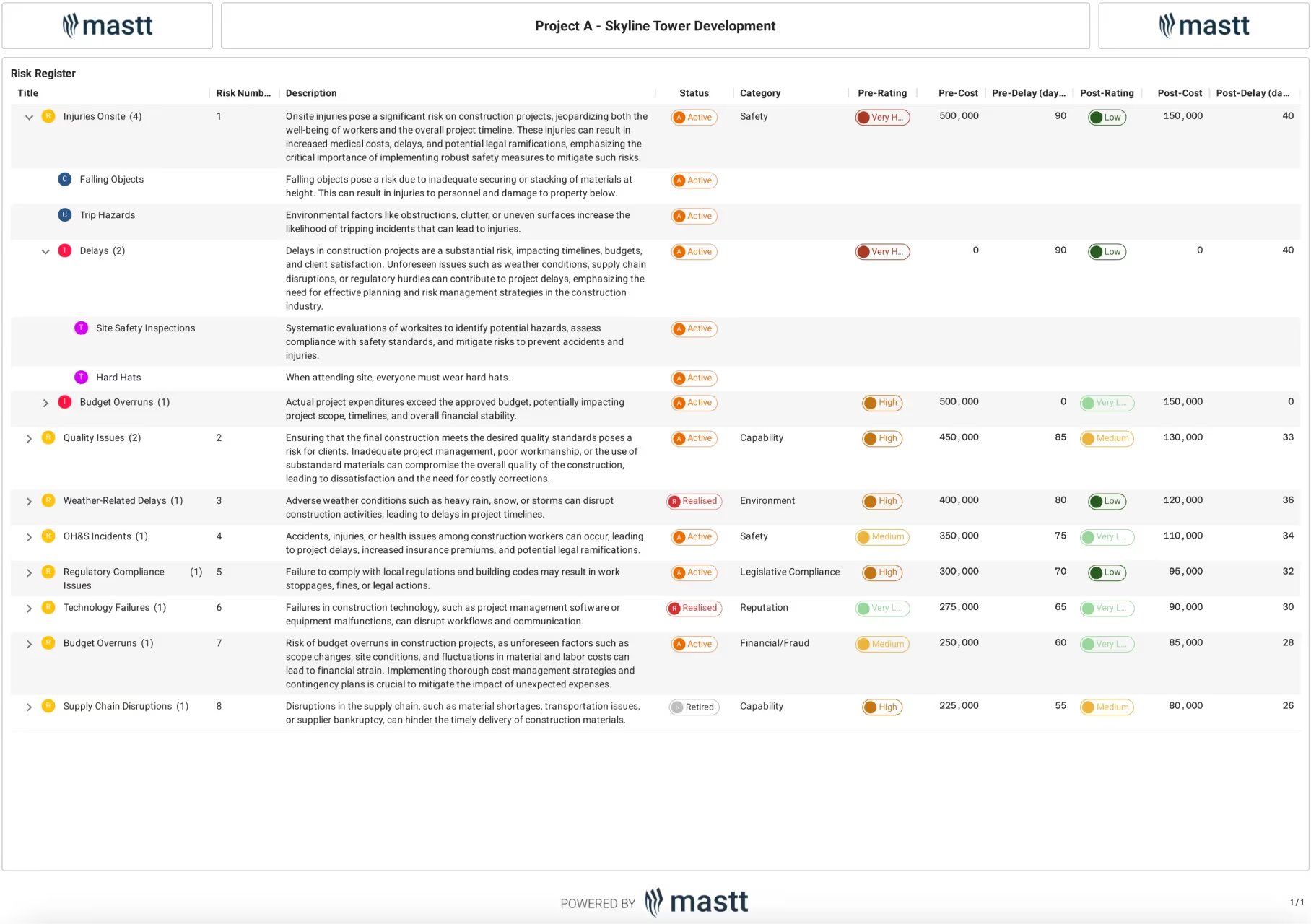Have you ever walked by a construction zone and been curious about the cryptic symbols on all those construction signs?
Those are construction safety signs, and they play a crucial part in keeping everyone safe. Unlike a quiet library, construction sites are a constant hum of activity with potential hazards around every corner.
Construction site signs warn of dangers (hazard signs), instruct workers on safety practices (mandatory signs), and provide valuable information (signs and their meanings).
Understanding what signs are required in capital projects; the fonts used in construction sign for maximum visibility and the meaning behind the colours and symbols can all contribute to a safer work environment.

Roadwork Ahead
Spot a sign that says, "Roadwork Ahead"? This is not just a heads-up for bumpy roads. It means construction or maintenance is up ahead, so be prepared to slow down, encounter delays, or follow detours. These signs keep you safe and ensure a smooth traffic flow and avoid traffic congestion during construction.

Detour
See a "Detour" sign? Do not fret; it is just construction ahead. This sign guides you around the work zone, offering an alternative route to keep you on track.

Men at Work
"Men at Work" signs are critical for drivers and pedestrians. The signs warn of nearby construction workers, reminding everyone to proceed with caution. Extra vigilance is key in these areas to ensure the safety of both workers and passersby.

Reduce Speed Limit
Look out for "Reduce Speed Limit" signs. These signals indicate a temporary change in the speed limit for the area's safety. Remember to adjust your speed to navigate the zone safely, protecting workers and yourself.

Prepare to Stop
A "Prepare to Stop" sign warns of potential traffic control measures ahead. Imagine flaggers directing traffic or temporary traffic lights managing the flow. Stay alert and adjust your speed accordingly or even stop completely, you will ensure a smooth traffic flow and avoid any surprises, keeping everyone safe.

Lane Closed
Be aware of "Lane Closed" signs. These signs warn drivers that one or more lanes are closed ahead. This usually means a merger with the remaining traffic is required. Keep your eyes peeled for your surroundings, adjust your speed as needed, and yield to allow for a smooth, zipper-like merger.

No Entry
Do not ignore the bold red and white "No Entry" signs. These signs typically mark restricted access points within the zone, ensuring worker safety and a smooth traffic flow.
If you encounter one, resist the urge to squeeze through. Instead, stay calm, locate an alternate route using detour signs, and avoid delays or safety hazards. Remember, following the rules of the road keeps everyone safe during the construction process.

Caution - Heavy Vehicles Turning
When you see this sign, be extra alert. This warning signals the presence of large construction vehicles entering or leaving the work zone.
These massive trucks can make wide turns, so adjust your speed and maintain a safe distance to avoid any surprises. Remember, everyone benefits from sharing the road cautiously.

Pedestrian Detour
"Pedestrian Detour" signs are there to help, not hinder you. These signs guide you along a safe, alternative path that bypasses the work area.
Following the detour keeps your walk smooth and hazard-free, ensuring you stay clear of any construction activity. Just relax, follow the signs, and enjoy your walk.

Safety Gear Required
This sign serves as a critical reminder for your safety. Entering this area requires the mandatory use of personal protective equipment (PPE) such as hard hats, high-visibility vests, and safety boots.
The specific gear needed will depend on the potential hazards, but following these instructions is essential. Think of it as suiting up for your safety adventure within the construction zone.

Danger -- Construction Area
Danger zones ahead! "Danger -- Construction Area" signs signal high-risk environments. These areas hold potential hazards for anyone who enters, so access is strictly limited to authorized personnel only. If you encounter this sign, keep a safe distance and be aware of construction vehicles entering or exiting the zone.

No Parking
Construction zones often mean temporary parking restrictions enforced by those bright yellow signs. Be a courteous neighbour and look for alternative parking nearby. This keeps the construction zone clear, avoids a potential tow truck hassle, and ensures everyone's safety on the road.

Stop/Slow (with Flaggers)
Don't be surprised by those bright orange or yellow paddles. They're not pool toys but a critical safety measure! Flaggers use these signs to control traffic flow, acting as human traffic lights.
A raised stop sign means precisely that - bring your vehicle to a complete halt. A slow sign indicates you can proceed cautiously but be prepared to stop again if necessary. Stay safe. Follow flagger’s signs.

End Roadwork
Battling construction zone blues? Seeing an "End Roadwork" sign means you've officially reached the finish line, leaving the cones, flares, and reduced speeds behind. Normal road conditions have returned.
Ease off the caution pedal, gradually accelerate to the posted speed limit (if safe to do so) and enjoy the uninterrupted road ahead. Congratulations, you've conquered the construction zone!

Site Office
Not all construction signs directly impact drivers or pedestrians, but they are still important. "Site Office" signs point the way for deliveries, inspectors, and other authorized personnel.
These signs typically mark a temporary building that serves as the administrative hub for the project, often containing offices, meeting spaces, and storage for plans and paperwork. These signs guide deliveries, inspectors, and others who keep the project running smoothly. It's a temporary HQ for plans, meetings and keeping things organized.

Heavy Plant Crossing
Keep your eyes peeled for "Heavy Plant Crossing" signs within a construction zone. These bright warnings signal the frequent movement of large machinery or vehicles throughout the area. Always be prepared for these massive trucks and equipment to cross paths with you, whether driving or walking. Extra vigilance and a healthy dose of caution are key to navigating this area safely.
Remember that construction zones are busy places with a constant flow of activity. Following the instructions provided by these signs on site can help ensure a safe environment for everyone.
Why Safety Signs Are Essential on Construction Sites
Construction sites come with risks, and workplace safety signage plays a key role in preventing accidents and ensuring compliance with Australian workplace health and safety (WHS) regulations. These signs warn about dangers, provide instructions, and guide workers and visitors, reducing the chance of injuries and legal issues.
Role of Safety Signs in Construction Site Safety
Hazards like falling objects, electrical risks, and moving machinery can cause serious injuries or fatalities. Construction site signage helps by:
- Highlighting workplace hazards such as high voltage areas, unstable ground, or restricted zones.
- Communicating essential safety rules, including mandatory protective gear like helmets and gloves.
- Providing emergency guidance, including exit signs, fire safety markers, and first aid locations.
- Helping visitors, new workers, and subcontractors understand safety rules instantly.
While safety training is crucial, hazard safety signs serve as constant visual reminders, reinforcing site rules and protecting workers.
Types of Construction Safety Signs Required by Law
Australian occupational health and safety (OHS) standards classify workplace safety signage into key categories:
- Prohibition Signs – Indicate restricted actions, such as “No Entry” or “No Smoking”.
- Mandatory Signs – Show required actions, like “Hard Hats Must Be Worn” or “Eye Protection Required”.
- Warning Signs – Alert workers to risks, such as “Caution: Uneven Surface” or “Beware of Falling Objects”.
- Emergency Information Signs – Mark first aid stations, fire exits, and emergency contacts.
- Danger Signs – Used for life-threatening hazards, such as “Danger: High Voltage” or “Confined Space Entry”.
Each construction safety sign is designed to prevent accidents and improve workplace hazard awareness.
Best Practices for Effective Safety Signage
For work safety signs to be effective, they must be highly visible and easy to understand. To comply with Australian safety regulations, follow these guidelines:
- Place signs in high-risk areas where they are clearly visible.
- Use simple graphics and bold text for instant recognition.
- Ensure signage is durable and weatherproof for long-term outdoor use.
- Conduct regular inspections to replace worn or faded signs.
By keeping construction site signage clear and well-maintained, businesses can reduce workplace hazards and improve compliance with WHS laws.
Legal Requirements for Safety Signs on Construction Sites
Under Australian workplace safety laws, all hazard safety signs must meet legal standards. Failing to comply can result in:
- Fines and penalties for not following WHS regulations.
- Higher risk of workplace injuries due to unclear hazard warnings.
- Project delays and legal complications affecting business operations.
Employers must ensure that workplace safety signage is correctly placed, properly maintained, and legally compliant.
Ensuring a Safer Worksite with Proper Safety Signage
Workplace safety signage is not just a requirement—it’s a critical safety tool for every Australian construction site. Proper construction safety signs protect workers, improve compliance, and help businesses avoid legal risks. By ensuring clear, visible, and compliant safety signs, construction companies can create a safer work environment for everyone.













.avif)


